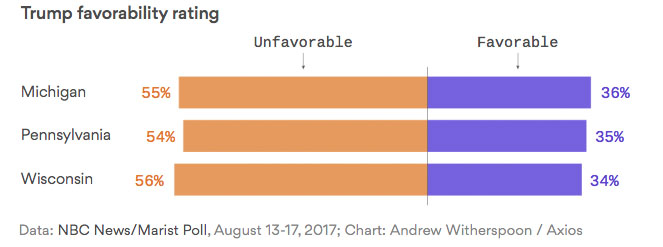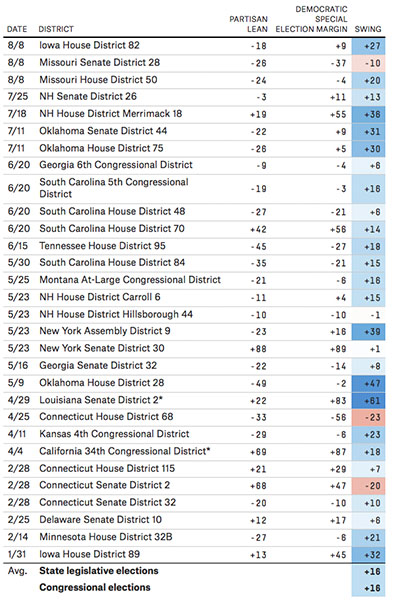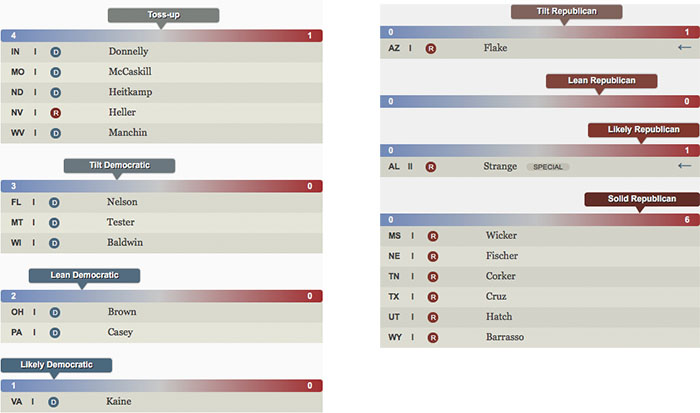New Senate: DEM 48 GOP 52
New polls:
Dem pickups: (None)
GOP pickups: (None)
Previous | Next
Trump to Speak Monday on Afghanistan
Many Native American tribes interpreted eclipses as a sign that something deadly was about to take place. So, perhaps it is apropos that Donald Trump will be announcing his plans for Afghanistan in a nationally-televised speech on Monday night, just hours after the end of the first full solar eclipse of the 21st century in the United States.
According to insider reports, Trump's plan is to add 4,000 troops to the 8,400 already in Afghanistan. As a military matter, this is a fairly small-scale move, and presumably has the fingerprints of the grownups—Sec. of Defense James Mattis, NSA Herbert McMaster—all over it. So, in the absence of more specific information, there is not much to be said. As a political matter, this might afford Trump a brief distraction from Charlottesville, and might allow him to pick up a few "strong leader" points with some of his voters who are wavering. However, it also opens him up to charges that—far from "solving" Afghanistan, as he promised—he escalated the conflict. Since Vietnam, there are few dirtier words in American politics than "escalate."
Presumably, Trump will explain today what endgame he and his team are working toward. And, he will hope that the Native Americans are wrong about the meaning of an eclipse. In particular, he'll hope that the Pawnee had it wrong, since their view was that an eclipse presaged the death of the tribe's leader. It is not known whether the Pawnee word for 'death' could also be interpreted to mean 'impeachment.' (Z)
Trump Is Unpopular in the States That Gave Him Victory
President Donald Trump won upset victories in three states—Michigan, Wisconsin, and Pennsylvania—that gave him the electoral votes needed to win the presidency. All three have now soured on him, according to a new NBC/Marist poll. Here is what the poll shows:

With a favorability of 34-36%, these states are close to Trump's national average. Unless he can improve these numbers substantially, he has little chance of being reelected. It will be a tall order for him to turn things around, since not only do the voters disapprove, but at least 60% in each state says that they are "embarrassed" by the President. (V)
Hostile Crowds Expected in Phoenix
Whenever Donald Trump appears in public, the White House tries to set it up so that he doesn't face hostile crowds. The problem, post-Charlottesville, is that it can be hard to find any other kind. When the President visits Phoenix for the latest in a series of re-election rallies on Tuesday, state and federal officials are bracing for large, loud, and very unfriendly crowds to show up for Trump.
The source of the crowds' ire is threefold. First, there is the President's failure to denounce neo-Nazis last week, which has hurt him across the country. Second, it is widely rumored that Trump will use the occasion to formally pardon former sheriff Joe Arpaio, whose actions toward minorities (particularly Latinos) while he was in office come dangerously close to being white supremacist in nature. Third, the President has waded into the local senate contest, and supporters of Sen. Jeff Flake (R-AZ) are not thrilled by his support for Kelli Ward.
Trump has the power to avoid this headache or, at very least, blunt its impact. He could postpone the rally to some future date not so close to the Charlottesville fiasco, and/or he could decide not to pardon Arpaio. Arizona lawmakers, both Democratic and Republican, have urged that both of these things would be wise ideas. But it is not Trump's style to be told what to do by anyone, particularly when there are wounds to be self-inflicted. So, he will proceed as planned. (Z)
McConnell in Strange Trouble
Senate Majority Leader Mitch McConnell (R-KY) has bet all his chips on keeping Sen. Luther Strange (R-AL) in the Senate. But a new poll shows that McConnell and Strange are in trouble. Former Alabama Chief Justice Roy Moore leads Strange in the runoff by a margin of 51% to 32%. This result suggests that Strange is hanging onto the 31% he got in the first round of the primary, but that most of the supporters of third-place finisher Rep. Mo Brooks (R-AL) have jumped on the Moore bandwagon.
McConnell doesn't want Moore in the Senate in the worst way. He is completely uncontrollable, having already defied a federal court that ordered him to remove a Ten Commandments monument from his court. Also one requiring him to allow gay people to marry. McConnell fears that if Moore wins the Sept. 26 runoff, he is very likely to get to sit in Attorney General Jeff Sessions' old seat and cause McConnell nothing but headaches. Especially since the 70-year-old Moore hardly has the 20 years it takes to acquire enough seniority to have any actual power in the Senate; six years of rabble-rousing fits his timeline far better. If Moore wins the runoff, there is even a very small chance that the Democrat could win the general election. (V)
White House Getting More Secretive
It would seem that the Trump White House does not want to forget any part of the Nixon playbook, from internal turmoil, to enemies lists, to four-letter language, to shady election shenanigans. So, it's not too much of a surprise that the administration is growing increasingly secretive, to the point of (possibly) breaking the law.
At issue, currently, are the lists of people who visit the White House. Early in Trump's term, the administration announced that it would reverse the Obama-era policy of making public the list of presidential visitors. That is, by all accounts, within Trump's legal rights, even if it's terribly non-transparent (and so, pretty much the opposite of "draining the swamp"). However, there are other important elements of the bureaucracy located within the White House, such as the Office of Management and Budget and the Council on Environmental Quality. They've been hiding their visitor lists, too. And so, advocacy group Public Citizen has sued.
The new lawsuit is actually the second one on this front; there is already a suit about Trump's policy of hiding presidential visitors. The administration's argument in both suits is that making the visitors' names public poses "grave national security risks and privacy concerns" as well as logistical problems. The lawsuits' argument is that the American people should know, among other things, what lobbyists the White House staff is meeting with, and how often. The outcome of the suits probably depends on which judge the plaintiffs get in front of, though the current administration's argument is certainly complicated by the fact that visitors lists did not pose "grave national security risks and privacy concerns" for Team Obama, which just withheld those names that might pose a problem (like, say, CIA operatives). In any case, polls make clear that fewer and fewer Americans trust Donald Trump. A little high-profile transparency—say, announcing a return to the Obama-era policy—could be good medicine on that front. On the other hand, that would entail doing what Barack Obama did, and there are few things Trump hates more. (Z)
Why Won't Top White House Officials Quit?
Many people have asked (rhetorically) why top government officials haven't resigned over Donald Trump's equating neo-Nazis with anti-Nazis and his apparent support for white supremacists. Axios' Mike Allen actually asked quite a few of them why they are staying. This is what they told him
- You have no idea how much crazy stuff we kill
- Defense Secretary James Mattis needs our help in managing Trump
- Trump is not as evil in person as he is on Twitter and on television
- We have great power over rules and regulations and their implementation, where we can do what we think is best
Allen asked one person how he could look his black friends in the eye after how Trump behaved with Charlottesville. The answer was basically: "I'm trying to help all Americans, and if I leave, I'm not so sure my replacement will have that goal." (V)
Bannon Has Big Plans
Former chief strategist to Donald Trump Steve Bannon doesn't take being fired lightly. He is already back at breitbart.com, but that may just be step one in the upcoming saga "Bannon's Revenge." According to Gabriel Sherman at Vanity Fair we are about to experience nuclear war. Not between the U.S. and North Korea, but between Bannon and Jared Kushner. Bannon and Kushner have always despised each other and clashed many times, and Bannon's supporting Trump when he equated neo-Nazis with anti-Nazis didn't smooth things over much with Kushner, an Orthodox Jew.
Precisely what Bannon has in mind is not clear yet, but Bannon had a conversation with his billionaire benefactor Robert Mercer last week. That was likely about the possibility of Breitbart joining forces with Sinclair Broadcasting to form a new television network that would compete with Fox News from the right. Fox makes at least some pretense of being a genuine news network; Breitbart TV would simply dispense with that and serve red meat all day long. Breitbart already has plenty of writers. Finding attractive blonde women who can read from a teleprompter is easy, especially if they are well paid. As to anchors, Bill O'Reilly is currently unemployed and looking for work. He's not cheap, though, which is where Mercer's money comes in. Other former Fox anchors might also be interested.
If Bannon follows through and begins really going after Kushner, it will get very ugly very fast. If he has to, Trump can fire NSA Herbert McMaster, whom Bannon also wants to take down. Ditto for Director of the National Economic Council Gary Cohn. But Trump is not going to fire Kushner or his daughter Ivanka, although they conceivably could resign (see below). A bloody battle between Bannon and the Trump administration would be a giant distraction to getting Trump's agenda through Congress. Time will tell. (V)
What about Jared and Ivanka?
If White House insiders, in general, are in something of a moral quandary about whether to stay or to go, the problem is presumably even more profound for first daughter and first son-in-law Ivanka Trump and Jared Kushner. On one hand, they are family of The Donald, and have been given a unique opportunity to put their imprint on the world. On the other hand, they are Democrats (or, at least, were until recently) and Jews who find themselves serving under a man who isn't certain whether Neo-Nazis are bad guys.
In a provocative editorial for CNN, Lev Golinkin—a Jew who has faced actual violence at the hands of anti-Semites—takes the couple to task on the latter account. He argues that the most basic precept of the religion, one that trumps all others (no pun intended), is preserving the sanctity of life. From this premise, Golinkin asks a profound question about Jared and Ivanka:
The silence from the White House flew in the face of this sacred tenet, assailing it at an almost elemental level. If two Jews at the pinnacle of American power—one, the grandson of Holocaust survivors, the other, a woman who had devoted years of rigorous study to converting to the religion—refuse to denounce Trump's equivocations on neo-Nazis, are they still Jews?
Should either of the duo happen to read this piece, surely it will give them pause, at least for a moment.
In any event, it's true that Trump and Kushner have not spoken out against the President. On the other hand, they've not spoken out on his behalf, either. Even when allies and associates, like Mike Pence, have done so loudly and forcefully. This certainly suggests that there is something of a divide fomenting in the White House. To put it another way, how many times can Jared and Ivanka look the other way while Donald Trump fails to condemn anti-Semitism, or forgets to mention the Jews in a Holocaust Day proclamation, or hires another alt-righter who rallies against the "international bankers" (translation: Jews)? It's not common for first children to break publicly with the president, but it has happened (Ron Reagan, for example). If that were to happen here, to a man who values family loyalty above all else, it would be a crushing blow to The Donald. (Z)
Democrats Have Done Very Well in Special Elections This Year
There have been 30 special elections in 2017, five for the U.S. House and 25 for state legislative seats. While past performance is no guarantee of future performance, as they say, it does give us a possible clue to the 2018 midterms. Before looking at this year's data, we note that the president's party has lost House seats in 18 of the 20 most recent midterms, with an average loss of 33 seats. If the 2017 special elections are any indication, the Republicans could take a real beating in the midterms, as expected from the historical data.
Five Thirty Eight has compiled a
nice list
of all 30 special elections so far this year. Here it is:

In both the congressional races and the state legislative races, the Democrat did 16 points better than the historical average for the district. In some extremely red districts, such as GA-06 and KS-04, the Democrat's gain was even bigger, but not enough to overcome the partisan balance of the district. Also, all these races were open seats, though. In 2018, most seats will not be open.
Nevertheless, a shift of even half of 16 points would be a tectonic shift. Such a shift is even plausible. The most recent generic congressional ballot puts the Democrats ahead 41% to 33%. Of course, it is a long ways to Nov. 2018 and candidates matter, but if the Democrats can keep up their energy and Republicans are depressed by the inability of Congress to enact its program, an 8-point shift towards the Democrats could certainly happen. That would flip dozens of seats and give Democrats control of the House. (V)
Inside Elections Has New Senate Ratings
Now let's go over to the other side of the Capitol and look at the Senate. Nathan Gonzales, who took over Stuart Rothenberg's old elections website, has new predictions out for the 2018 Senate races. The map strongly favors the Republicans, since they have only 8 seats up, all but one of them in (deep) red states. The Democrats and the two independents who caucus with them have 25 seats up, including 10 in states Donald Trump won. Here is Gonzales' take on the races other than the safe Democratic states:

There are a couple of things that are noteworthy here. First, none of the 10 Democratic senators in Trump states are favored to lose. In fact, only four are in toss-up races: Joe Donnelly (IN), Claire McCaskill (MO), Heidi Heitkamp (ND), and Joe Manchin (WV). We agree with the first three, but think that Manchin is a considerably better-then-even shot due to his personal popularity. We also disagree with Gonzales' call that Sen. Dean Heller (R-NV) is in a toss-up race. Nevada is sort of blue, the Democrats have a strong candidate, and Heller is not very popular. Heller is probably the underdog here.
Other than Manchin and Heller, Gonzales' take seems pretty reasonable to us. One thing to note is that he has Sen. Debbie Stabenow (D-MI) as safe, despite the possible entry of Kid Rock. Either he doesn't think Rock will run or he thinks just because outsider Trump won that doesn't mean that every outsider can win. Besides, a lot of people who voted "for Trump" were really voting "against Hillary Clinton." That won't be true in Michigan. Republicans don't like Stabenow because she is a Democrat, but they don't despise and hate her with all their being, as was the case with many anti-Clinton voters.
One race that is subject to change is that of Sen. Jeff Flake (R-AZ). Flake is taking a big gamble by running on a clear anti-Trump platform. If primary challenger Kelli Ward (R) catches fire, Flake might not even make it to the general election, so Arizona is very hard to call at this point. And if Sen. John McCain (R-AZ) dies before the election, that could shake things up, too. (V)
Back to the main page